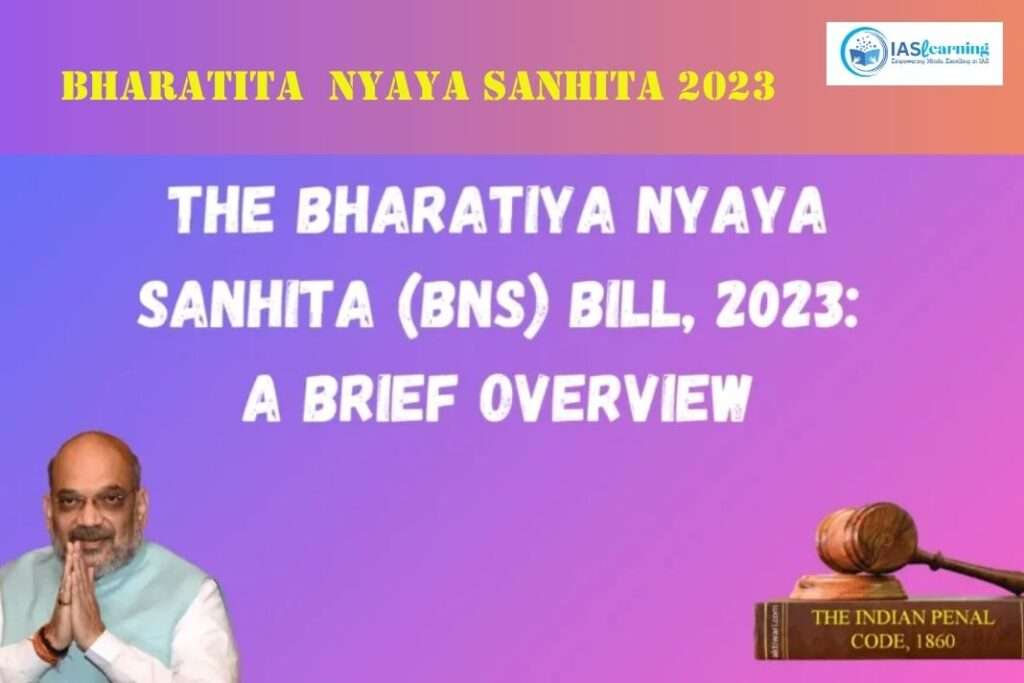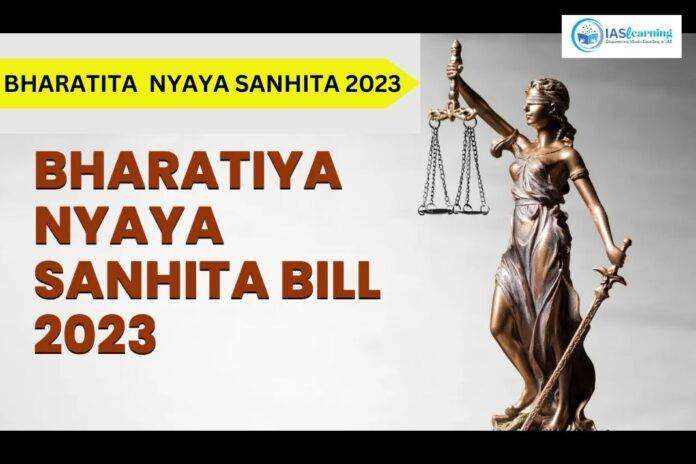For Prelims:
About Bharatiya Nyaya Sanhita Bill, 2023?
For Mains:
GS 2: Governance
Significance of Bharatiya Nyaya Sanhita Bill, 2023?
Concerns and Limitations of Bharatiya Nyaya Sanhita Bill, 2023?
Way forward?
Introduction to Bharatiya Nyaya Sanhita Bill, 2023
Context
The Bharatiya Nyaya Sanhita Bill 2023 has been making headlines as it was recently introduced in the Lok Sabha. This bill aims to replace the Indian Penal Code (IPC), which dates back to 1860. The proposed reform has sparked discussions and debates regarding the potential changes it could bring to the country’s criminal justice system and the impact it may have on various aspects of Indian law and society.

Background:
In 2020, the Ministry of Home Affairs took a significant step by establishing a committee headed by Dr. Ranbir Singh, the former Vice Chancellor of the National Law University (NLU) in Delhi. The primary objective of this committee was to conduct a comprehensive review of the three existing codes of criminal law in India.
The committee was entrusted with a specific mandate, which included recommending reforms to the country’s criminal laws in a principled, effective, and efficient manner. These reforms were expected to achieve several crucial goals:
- Ensuring the safety and security of individuals, communities, and the nation as a whole.
- Prioritizing and upholding the constitutional values of justice, dignity, and the inherent worth of every individual.
After a period of deliberation and study, the committee submitted its recommendations for amendments to the criminal laws in February. These recommendations were anticipated to have a significant impact on the legal landscape of the country, with the overarching goal of enhancing the safety, security, and justice for all citizens.
What is IPC,1860?

The Indian Penal Code (IPC), 1860, holds historical significance and is a key piece of legislation in India. Here’s an overview of IPC, 1860:
Origin: The IPC, 1860, was introduced in the aftermath of the Rebellion of 1857 and is attributed to Lord Thomas Babington Macaulay. It was enacted during British colonial rule and remains one of the longest-surviving codes in the common law world.
Recommendation: The IPC, 1860, was based on the recommendations of the 1st Law Commission of India, which was established in 1834 under the Charter Act of 1833. The commission played a pivotal role in shaping the legal framework of the country.
Substantive Law: The IPC, 1860, serves as a comprehensive law that defines both rights and responsibilities in civil law matters and crimes and their associated punishments in criminal law.
Punishments: The IPC, 1860, categorizes punishments into five major sections, including death penalty, imprisonment for life, general imprisonment, forfeiture of property, and fines. These categories are used to determine the penalties for various offenses under the code.
The IPC, 1860, continues to play a crucial role in India’s legal system and serves as a foundational document for defining criminal offenses and their corresponding legal consequences.

Key Changes proposed in the bills are:
The proposed changes in the Bill bring significant amendments to the legal landscape, particularly in areas related to sedition, terrorism, organized crime, and various offenses. Here’s a summary of the key changes:
Sedition:
- The Bill replaces the IPC definition of sedition with new offenses, including exciting or attempting to excite secession, armed rebellion, or subversive activities.
- Encouraging feelings of separatist activities or endangering the sovereignty and unity of India are also punishable.
- Penalties for these offenses range from imprisonment of up to seven years or life imprisonment, along with a fine.
Terrorism:
- The Bill defines terrorism as acts intending to threaten the unity, integrity, and security of the country or intimidate the public.
- Terrorist acts encompass various actions such as using firearms, explosives, or hazardous substances to cause harm, destroy property, or disrupt essential services.
- Penalties for terrorism range from death or life imprisonment (if resulting in death) to imprisonment between five years and life (for other cases), along with a fine of at least five lakh rupees.
- Conspiring, organizing, or assisting in preparing terrorist acts is also punishable with imprisonment between five years and life imprisonment and a fine of at least five lakh rupees.
Organized Crime:
- The Bill defines organized crime as continuous unlawful activities carried out using violence, intimidation, or other illegal means to obtain material or financial benefits.
- Penalties for attempting or committing organized crime include death or life imprisonment (if resulting in death) and imprisonment between five years and life (in other cases), along with a fine.
Petty Organized Crime:
- The Bill introduces penalties for attempting or committing petty organized crimes, which are carried out by organized criminal groups and cause general feelings of insecurity among citizens.
- These crimes include organized pickpocketing, snatching, and theft, with penalties ranging from one to seven years of imprisonment and a fine.
Murder by a Group on Grounds of Caste or Race:
- The Bill specifies separate penalties for murder committed by five or more individuals based on race, caste, sex, place of birth, language, or personal belief.
- Each offender is punishable with imprisonment between seven years and life or death, along with a fine.
Death Penalty for Gang Rape of Minor:
- The Bill extends the applicability of the death penalty to cases of gang rape involving women below 18 years of age.
Sexual Intercourse by Deceitful Means:
- The Bill penalizes sexual intercourse with a woman (not amounting to rape) through deceitful means or a promise of marriage without intending to fulfill it.
- It is punishable with simple or rigorous imprisonment for up to 10 years, along with a fine.
Extending Applicability of Offenses to Boys:
- Under the IPC, importing girls under the age of 21 years for illicit intercourse is an offense. The Bill extends this provision to cover the importing of boys under the age of 18 years for illicit intercourse with another person.
Frequently Asked Questions (FAQs) on the Bharatiya Nyaya Sanhita Bill, 2023:
1. What is the Bharatiya Nyaya Sanhita Bill, 2023?
- The Bharatiya Nyaya Sanhita Bill, 2023 is a proposed legislation aimed at reforming India’s criminal justice system. It seeks to replace certain provisions of the Indian Penal Code (IPC) and introduce new offenses and penalties.
2. What are the key changes proposed in this bill?
- The bill proposes significant changes, including the replacement of sedition with new offenses, redefining terrorism, introducing penalties for organized crime, addressing sexual offenses, and more.
3. How does the bill address sedition and related offenses?
- The bill removes the offense of sedition and replaces it with new provisions related to separatism, armed rebellion, and endangering the sovereignty and unity of India. It introduces penalties for these offenses.
4. What are the provisions related to terrorism in the bill?
- The bill defines terrorism and outlines various terrorist acts. It prescribes severe penalties, including death or life imprisonment, for acts that result in death and imprisonment terms for other cases.
5. How does the bill address organized crime and petty organized crime?
- Organized crime is defined as continuous unlawful activities carried out by individuals or groups for material or financial gain, and the bill proposes strict penalties for it. Petty organized crime is also addressed, with penalties for offenses causing insecurity among citizens.
6. What changes does the bill introduce in cases of sexual offenses?
- The bill penalizes sexual intercourse by deceitful means or promises of marriage without intent. It also extends the applicability of certain offenses to boys.
7. How does the bill address murder based on caste, race, or other grounds?
- The bill specifies separate penalties for murder committed by five or more individuals on grounds such as race, caste, sex, place of birth, language, or personal belief.
8. What is the significance of the Bharatiya Nyaya Sanhita Bill, 2023?
- The bill aims to modernize India’s criminal laws, repeal outdated provisions, introduce new offenses, and align the legal framework with contemporary challenges while upholding constitutional values.
9. What is the current status of the bill?
- As of now, the bill has been introduced in the Lok Sabha for consideration. Its progress and potential enactment will depend on legislative processes and discussions.
10. How can I stay informed about developments related to this bill?
- To stay updated on the Bharatiya Nyaya Sanhita Bill, 2023, you can follow news sources, government announcements, and legislative updates. Additionally, legal experts and organizations may provide insights and analysis on the bill’s impact and implications.

